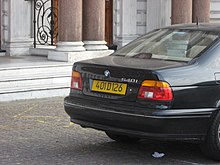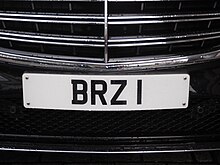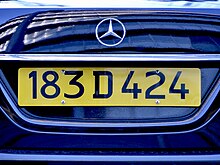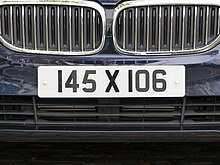This is a list of country codes on UK issued diplomatic vehicle registration plates, i.e. the first group of three numbers.
Since 1979, motor vehicles operated by foreign embassies, high commissions, consulates and international organisations have been issued unique vehicle registration marks with a distinguishing format of three numbers, space, letter D or X, space and three numbers. The letter D is used for diplomats and X for non-diplomatic accredited personnel.
The first group of three numbers identifies the country or international organisation. The second group of three numbers is a serial number sequence starting at 101 for diplomats, 400 for non-diplomatic staff of international organisations, and 700 upwards for consular or other non-diplomatic staff.
Eligible officials are required to be accredited by the Foreign & Commonwealth Office (FCO) who liaise with Specialist Registrations at the Driver & Vehicle Licensing Agency (DVLA) for issuance. Guidance document INF267 (4/18) has been produced by the DVLA for accredited officials.
Honorary consuls are not entitled under UK law to diplomatic vehicle registrations and/or driving permits.
Many foreign embassies and high commissions have acquired 'flag' plates from the historic British car numbering systems, for example, CAN 1 (Canada), AUS 1 (Australia), BEL 12E (Belize), BF 1 and BF 2 (Burkina Faso), CHN 1 (China), FIJ 1 (Fiji), FRA 1 (France), 1 HKG (General-Director of Hong Kong Economic and Trade Office), IC 1 (Iceland), 1 NWY (Norway), NZ 1 (New Zealand), 1 PNG (Papua new Guinea), 1 JAM (Jamaica), 1 TOG (Togo), ZIM 1 (Zimbabwe), etc.
Embassies, high commissions, consulates and international organisations




References
- "Matrículas de Reino Unido". matriculasdelmundo.com.
- "Diplomatic number plates explained - UK Registrations". www.ukregplates.co.uk. Retrieved 26 March 2023.
Newall, L.H. (28 September 2023) . A History of Motor Vehicle Registration in the United Kingdom (2008 ed.). Newby Books. ISBN 978-1-872686-32-5.